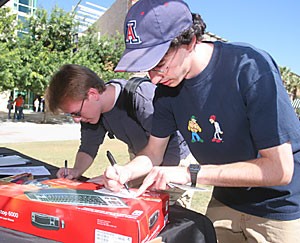Virtual reality, solar-powered backpacks and Internet security were the innovations highlighted of Tech Fair ’06, a showcase of UA science departments’ accomplishments and UofA Bookstore vendor products on the UA Mall yesterday.
At the forefront of the fair was information about the two new wireless networks that cover 60 percent of campus – one offering public access and the other a secure UA network.
“”Students need to know what they’re connecting to,”” said Kelley Bogart, information security coordinator for the Office of Student Computing Resources.
The public network is an unencrypted network where a connected user could potentially view information transmitted by anyone else on the network, Bogart said.
“”The public network is for the occasional person who isn’t part of the (UA) database,”” like visitors who are there for a show or conference, Bogart said.
Bogart and other OSCR employees helped students set up connections to the secure UA WiFi network and said knowing the difference between the networks could prevent cyber crime.
Christina Montano, manager of the Computer and Technology Store at the UofA Bookstore, which sponsored the event, said the Tech Fair’s most important goal is to show the students what is available for them, whether it is wireless Internet or software.
“”Students can get really good discounts on Microsoft and Adobe suites,”” said Montano.
The software suites include commonly used programs like Photoshop and PowerPoint.
Some students, like systems engineering senior Anwar Musa, were simply attracted by the signs that advertised raffles every half hour.
“”I hope I win a jump drive,”” said Musa as he walked toward the other booths.
Other features included recent projects developed by UA science departments.
The Arizona Laboratory for Immersive Visualization Environments, called AZ-LIVE, created by the Center for Computing Information and Technology in 2005, is a virtual reality simulator capable of allowing researchers to walk through computer-generated versions of their newest creations.
“”A lot of people don’t know about us, but they should,”” said Faith Vance, an assistant research computing manager for CCIT.
So far, AZ-LIVE has been used by professors from 15 departments on campus, ranging from fine arts to aerospace and mechanical engineering.
“”The campus departments don’t always have a venue to display what they’ve been working on,”” said Montano. “”I think we are making headway.””
Volere, a small startup company out of Southern California, advertised its “”solar backpack,”” which uses indirect and direct lighting to power iPods, cell phones and handheld devices.
Jeffery Hill, vice president of sales for Volere, said, “”The unique thing about these is that they use indirect lighting, inside classrooms for example, to charge things that students need.””









